
 Communication Workers Union (CWU) general secretary Dave Ward (centre) joins postal workers on the picket line at the Camden Town Delivery Office in north west London, November 24, 2022
Communication Workers Union (CWU) general secretary Dave Ward (centre) joins postal workers on the picket line at the Camden Town Delivery Office in north west London, November 24, 2022
THE TUC will convene a summit in the next six months to agree a strategy to secure collective bargaining across most sectors of the economy.
Communication Workers Union leader Dave Ward moved a motion calling for the summit and for the TUC general council to follow it with a published collective bargaining strategy that can be agreed at next year’s Congress, so the labour movement can implement a common plan to restore workers’ right to collectively bargained terms and conditions.
Mr Ward said: “We delivered the new deal for working people,” which Labour is now committed to implementing. “Labour didn’t deliver it, it started here six or seven years ago.

CWU leader DAVE WARD tells Ben Chacko a strategy to unite workers on class lines is needed – and sectoral collective bargaining must be at its heart

KEVAN NELSON reveals how, through its Organising to Win strategy, which has launched targeted campaigns like Pay Fair for Patient Care, Britain’s largest union bucked the trend of national decline by growing by 70,000 members in two years

RMT leader Eddie Dempsey's stark warning shook up a fringe meeting at the Scottish TUC











